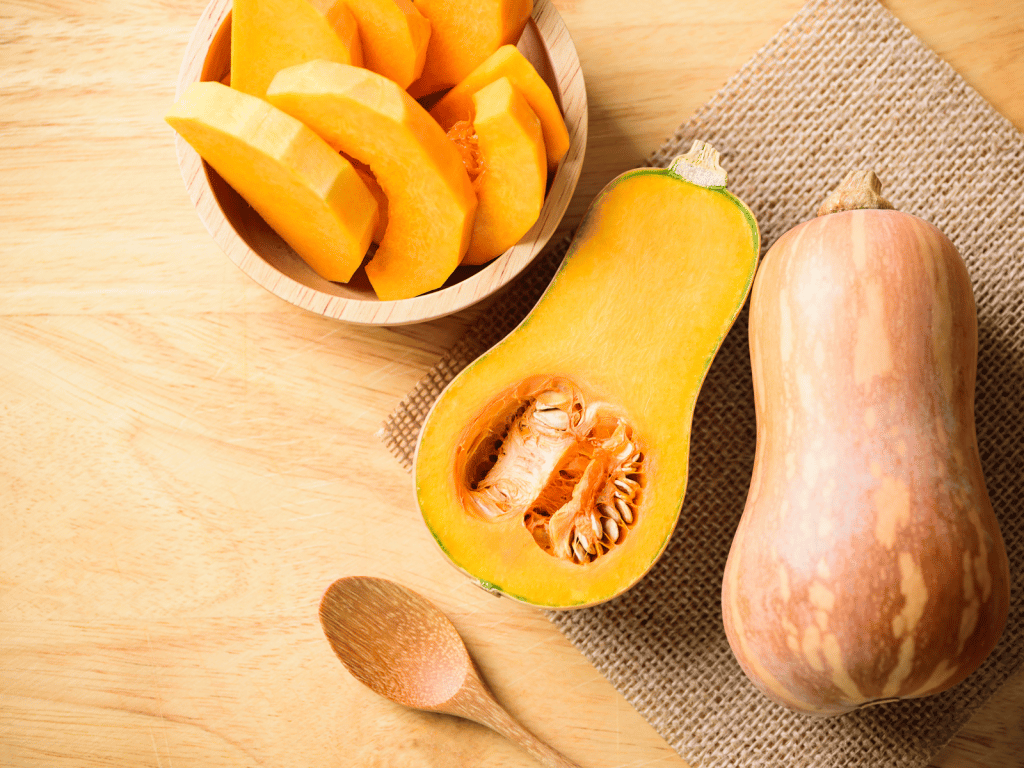Putting vegetables into your dog’s daily dish can be a great way to give them some extra fiber and nutrients. But, it must be said that dogs are not natural herbivores. They can eat some veggies, but you really need to take a close look at the nutritional contents, the relevant safety considerations, and proper preparation. So, our question today is, can dogs eat butternut squash? We think you’ll be happy with what we found out.
Can Dogs Eat Butternut Squash?

If you’re a fan of butternut squash and want your dog to enjoy it with you, you’re in luck, because dogs can indeed eat butternut squash. As usual, there are things you should and should not do when feeding butternut squash to your dogs.
You will need to limit the amount your dog eats, and you will need to prep it in certain ways. For a start, it needs to be cooked fully. Cooking butternut squash will help ensure that any remaining lectins are destroyed.
Lectins are molecules that plants use as a defense against bugs, but they can damage the intestinal walls of larger animals over time.
You want to make sure to completely remove the rind and outer skin. That is where the bulk of natural and unnatural pesticides will be concentrated. It is also important to cook the butternut squash well since this helps bring out its savory flavor and enhance the flavor of the dog food it is mixed with.
Some dogs will eat properly prepped butternut squash with nothing else. But in most cases, your dog will want to have it mixed with their regular dog food. This helps your dog food budget to go further. It also makes it easier to make sure not to give your dog more butternut squash than is recommended.
What Exactly is Butternut Squash?

If you have gotten this far, you probably know what butternut squash is, but if not, stay tuned. Butternut squash is a brightly colored vegetable that is shaped like a bell. It is usually yellow or muted orange to milky white in color also called Yellow Squash.
It is about the size of a cantaloupe but is longer than it is round. It is sometimes classified as a fruit because it has internal seeds. The seed clusters are concentrated in the bottom, bell-shaped portion.
Most people consider it a vegetable because it is more savory than sweet. At least it is used in savory style cooking more often than not.
As you may be aware, many vegetables are toxic to dogs. You will be glad to hear that butternut squash is not one of these. However, it is still best to limit the amount of butternut squash that your dog eats, due to the fact that dogs are carnivores and not herbivores.
Are There Any Benefits of Butternut Squash for Dogs?
Despite the fact that veggies are not in perfect alignment with a dog’s natural diet, there are some nutritional advantages to butternut squash for dogs. Adding the right fruit, herbs, and vegetables to your dog’s diet will provide them with vitamins and minerals they won’t get much of otherwise, and the fiber helps their digestive tract to stay healthy.
The added variety will help keep your dog’s diet interesting. Feeding any creature exactly the same thing day in and day out is sure to lead to dissatisfaction. Butternut squash can be a wonderful part of the remedy for this.
A 200-gram serving of butternut squash contains the following nutrients:
- Calories: 82
- Carbs: 22 grams
- Protein: 2 grams
- Fiber: 7 grams
- Vitamin A: 457% of Recommended Daily Intake (RDI)
- Vitamin C: 52% RDI
- Vitamin E: 13% RDI
- Thiamine (B1): 10% RDI
- Niacin (B3): 10% RDI
- Pyridoxine (B6): 13% RDI
- Folate (B9): 10% RDI
- Magnesium: 15% RDI
- Potassium: 17% RDI
- Manganese: 18% RDI
Getting Your Dog to Love Butternut Squash
The first thing to remember is that the butternut squash you give to your dog should be free of seeds, rind, and stem. These contain lectins that are not good for anyone, especially dogs.
Be sure to cook it, but not too much. This will destroy toxins and degrade sugars that you don’t want your dog to consume.
Like most fruits and vegetables that are okay for dogs to eat, there is a recommended limit. He should not have it more than two to three times per week. On the days when you feed butternut squash to your dog, it should not be more than 15 to 20% of his total intake for the day.
Follow these guidelines for safety, and to maximize your dog’s eating experience. Also, be sure to check back often for more tips on what’s good and what’s bad for your best four-legged pal.



